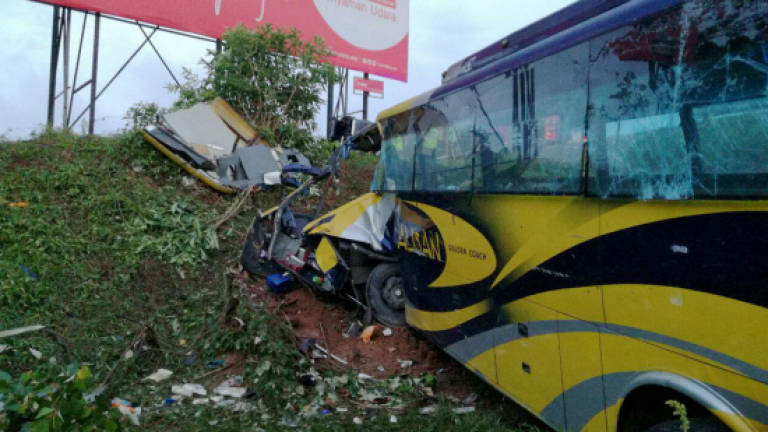Ban express bus travels during 'sleepy hours'

KUALA LUMPUR: Yet another express bus crash has claimed many more lives but it is business as usual, without serious efforts to make such travels safer and no lessons seemed to have been learnt from past tragedies.
This is the grim conclusion that can be drawn from the crash early this morning at Km137.3 of the North-South Highway at Kampung Jayor in Pagoh, Johor, when a bus travelling to Kuala Lumpur from Johor Baru lost control and plunged into a 10m ravine, killing 14 people and injuring 16 others.
This Christmas Eve tragedy is just one of quite regular express bus tragedies in the last decade or so that have killed so many people, especially during festive seasons, when the demand for this public transportation normally reaches its peak.
There is a familiar ring to circumstances surrounding such crashes, as most happened in the wee hours of the morning, when our body system dictates that one should be in bed instead of on the road.
It is less critical for an individual's car which normally carries just the driver or one or two passengers but for express buses with dozens on board, it is high time the authorities consider seriously banning such buses from operating during what I would call as "uncivilised hours".
The fact that this latest crash took place at 3.30am strongly suggests that sleep-driving or sleep-deprived driving is the most likely cause but in this particular case, the driver could not tell any story to the police as he was also killed.
And at that unearthly hour, one can only conclude that most, if not all the passengers were fast asleep.
Sleep-driving or sleep-deprived driving is an issue rarely discussed in public forums on road safety or at related safety campaigns in Malaysia but I would argue here, it is a major cause for the ever mounting fatalities on our roads.
This phenomenon is the operation of a motor vehicle while being cognitively impaired by a lack of sleep, which can impair the human brain as much as alcohol can.
Sleep deprivation has proven to affect driving ability in three areas such as impairing coordination, causing longer reaction times and impairing judgment even for only a few seconds of being sleepy.
In the United States, an estimated 250,000 drivers fall asleep at the wheel daily, and sleep-driving is a factor in more than 100,000 crashes annually resulting in over 1,500 deaths and 40,000 injuries.
As far as I know, despite the large number of vehicles plying our highways during such 'sleepy hours', there has been no research finding that has been released on this or even if such research has been carried out in the first place.
In the US, it has been estimated that between 16% and 60% of all accidents have sleep-deprivation as a cause and accidents related to it are most likely to happen in the early morning hours to mid-afternoon and is a major problem among truck drivers and in the military as well.
In the United Kingdom, a motorist can be convicted of causing death by dangerous driving if the prosecution can prove that the motorist knew that he or she had been deprived of sleep and killed another person as a result of driving while sleep-deprived.
In Malaysia, while the traffic police or Road Transport Department (JPJ) staff are often seen manning roadblocks especially during post-midnight hours, they are more interested in checking if our road tax has expired or looking for suspects.
We also have all kinds of signs warning us of speed limits and the latest digital ones on traffic jams at certain sections of roads but there's none alerting motorists on the dangers of sleep-driving. — Bernama